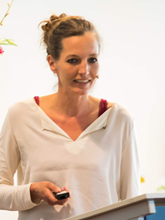Anna Lichtwarck-Aschoff appointed Professor of Special Needs Education

The Executive Board of the RUG has appointed Anna Lichtwarck-Aschoff as Professor of Special Needs Education at the Faculty of Behavioural and Social Sciences with effect from 1 January. There she will hold the chair Special Needs Education, in particular Care for Children with Behavioral and Educational Problems.
Within her research, for which she received a Vidi, Lichtwarck-Aschoff will focus on recognizing and predicting tipping points in clinical change processes. Lichtwarck-Aschoff: "We know that clients do not develop in a straight line, this is often accompanied by sudden jumps, so-called tipping points. We know that these qualitative jumps are preceded by a period of destabilization, of increased fluctuations in which the client starts to move and may also be more susceptible to interventions. On the one hand I want to look at the factors that cause a person to enter such a fluctuating state: for example, it may be that a person begins to gain hope and therefore becomes more emotionally active. On the other hand I want to investigate whether it is the case that clients are more susceptible to interventions in a phase of instability. Because of this, we could eventually improve the timing of interventions, which in turn improves the effectiveness".
iamYu
In her research Lichtwarck-Aschoff makes use of the app iamYu, which she co-developed together with adolescents and professionals for the youth care sector. The app can be adapted by adolescents and their counsellors to their needs, so that they only collect the information that is relevant to them. Based on this data, both adolescents and their counsellors can gain insight into the personal and dynamic change process and can predict tipping points and indicate sensitive periods. In November 2019 the app was awarded the 3rd prize of the ZonMw Medische Inspirator prijs; an award for the most inspiring collaboration between clients and researchers.
Away from cookbook thinking
According to Lichtwarck-Aschoff, in the health care sector a lot of attention is paid to the label of a client and too little to the individual. The result is that a client is treated according to prescribed steps, as if it were a recipe from a cookbook. "One size doesn't fit all" laughs Lichtwarck-Aschoff. "Every person develops differently, and by looking at the data of one individual, a professional can focus and adjust the treatment much better. At the end of the day, I want children, adolescents and everyone else to be able to say: this is really about me".
More news
-
03 February 2026
‘Such willpower’
-
20 January 2026
Alcohol, texting, and e-bikes
-
13 January 2026
Lonneke Lenferink joins The Young Academy


